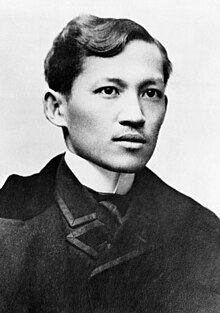Rizal Law
The Senate Committee on Education sponsored a bill co-written by both José P. Laurel and Recto, with the only opposition coming from Francisco Soc Rodrigo, Mariano Jesús Cuenco, and Decoroso Rosales.[2][3] The Archbishop of Manila, Rufino Santos, protested in a pastoral letter that Catholic students would be affected if compulsory reading of the unexpurgated version were pushed through.The assertion that Rizal limited himself to castigating undeserving priests and refrained from criticizing, ridiculing or putting in doubt dogmas of the Catholic Church, is absolutely gratuitous and misleading."[3] The senator from Sulu, Domocao Alonto, attacked Filipinos who proclaimed Rizal as "their national hero but seemed to despise what he had written", saying that the Indonesians used Rizal's books as their Bible on their independence movement; Pedro López, who hails from Cebu, Cuenco's province, in his support for the bill, reasoned out that it was in their province the independence movement started, when Lapu-Lapu fought Ferdinand Magellan.Section 2 mandated that the students were to read the novels as they were written in Spanish, although a provision ordered that the Board of National Education create rules on how these should be applied.
Congress of the PhilippinesLong titleNoli Me TangereEl FilibusterismoPhilippinesRamon MagsaysayJose RizaleducationJosé RizalCatholic Church in the Philippinesanti-clericalismNoli Me TángereCongregation of the MissionKnights of ColumbusKnights of RizalJosé P. LaurelFrancisco Soc RodrigoMariano Jesús CuencoDecoroso RosalesArchbishop of ManilaRufino Santospastoral letterArsenio LacsonCuencopurgatoryIndonesiansLapu-LapufoughtFerdinand MagellanPhilippine languagesFidel V. RamosDepartment of Education, Culture and SportsResponsible Parenthood and Reproductive Health Act of 2012AkbayanKaka Bag-aoCruz-Araneta, GemmaManila BulletinPhilippine Daily InquirerOcampo, AmbethManila StandardPhilippine StarPhilippines Free Press
